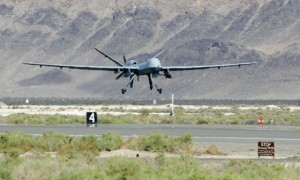One fine morning several weeks ago, I received a phone call from the local FBI office requesting an interview about Barrett Brown, former spokesperson for the Anonymous hacking collective. I told the agent, on the phone, that I didn’t really have any useful information, but he still wanted to talk to me. I didn’t see the harm in it, so I agreed to meet him that afternoon at a nearby coffee shop. For the rest of the day I grew increasingly nervous about the meeting as new and scarier possibilities came into my mind, despite their improbability. Was this guy a legitimate FBI agent, or was he something else? Did he intend to harm me, or possibly kill me?
I arrived to the coffee place a few minutes early and browsed through a selection of used books which included Bruce Sterling’s Hacker Crackdown — on sale for ten cents. Nearly immediately, I was accosted by a gregarious teenage girl, who complimented my beard and compared me to a popular musician I had never heard of. She was blonde, cute, and bubbly, but just underneath the surface lurked high culture. For the next few minutes we talked about Nietzsche and Goethe, until I saw the FBI agent staring at me from the corner of my eye. I said to the girl something like, “I’m sorry. I’m here to meet an FBI agent and talk to him about some shit.” She did not ask why, but instead exclaimed, loudly, “I hope he doesn’t drag you away and poison you!” This bizarre exchange, to which I have done little justice, was surely within earshot of the agent, and I still wonder whether it was some insidious kind of psychological manipulation. I am sure it was even stranger from the point of view of the agent.
He sat at a small table with a little pile of papers, and I joined him. On the papers were questions for me and information about me. I saw my driver’s license photo in full color for the first time, but with a distorted aspect ratio which widened my face. His manner was gentle, as you’d expect from a computer guy, and he wore an impeccable grey suit with fancy wingtip shoes. Because he alluded to a position with national security implications, that is all the description I will provide. Despite warning me that he was not an expert on Anonymous, he came across as generally well-informed, if not hopelessly misled on a few specifics. His praise for my writing was effusive and embarrassing, so much so that he apologized, and I could not help but glance at the girl, who now sat with her friends just a table away, as circuit breakers in my brain began to blow. What does she think of me, sitting here, getting this kind of incredible praise from an FBI agent? Surely she must be hearing this shit, and certainly she must not believe any of it. This boiling cauldron of ego soup was all the hotter for the chilling anxiety I had felt leading up to it. Yet, for all that, I did not detect a hint of inauthenticity in the agent’s manner, and, in fact, I saw genuine disappointment after a joke he told bombed because of my abnormally serious demeanor.
The business of the interview, the source of my anxiety, turned out to be a bit of a sad joke and far less disconcerting than all the continuous praise. Several questions, for instance, hinged on a case of mistaken identity. Because I use the pseudonym Kilgore Trout and had been somewhat of a nemesis to Barrett Brown, the FBI had apparently connected me with another Kilgore Trout who was, several years before I knew of Brown, also at odds with Brown. Both Brown and the other Trout had participated on the Little Green Footballs web site, some despicable hole of fringe punditry, but I knew very little about it. The agent claimed Brown had tasked a hacker with cracking Little Green Footballs — a fairly explosive piece of information. Evidence of Brown giving jobs to hackers has been alluded to in many stories about LulzSec, but no one has been sure of Brown’s level of involvement. If it was true he tasked someone with hacking Little Green Footballs, then his involvement with LulzSec could have possibly been pivotal. It was shocking, but of course I knew nothing that could be of help in any case. With grave seriousness which was not present in any other part of the conversation, he asked something like, “You once wrote that Barrett Brown worked for China or Russia. Is this true?” Like his joke that bombed earlier, my mind was too messed up to laugh at the right cue, and I did my best to seriously explain the joke. While anything is possible, I can’t get over the certainty that the FBI, in general, is seriously convincedin Anonymous and its possible connections to foreign power. It brings to mind reports out of Iranian state-owned media that attacks by Anonymous are orchestrated by the American government.
It’s nice to be reminded that law enforcement agents are real people, but it’s also a bit disturbing — because they’re real people. Anons, especially, tend to imagine law enforcement as a monolithic edifice which sees all and acts like a hatefully inhuman machine in exacting draconian punishments for the smallest infractions. Maybe that likeness is accurate enough in a few cases, but at the same time it’s really humans we’re talking about — prone to the same fear, misinterpretation, misinformation, and confusion as the rest of us.


